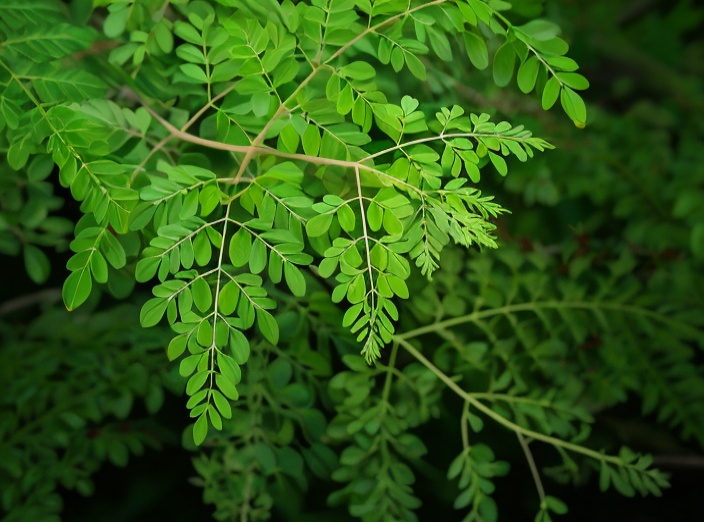Moringa oleifera, also called the “Miracle Tree,” is a fast-growing, drought-resistant plant native to northwestern India.In South America, Asia, and South Africa, it also flourishes. Commonly referred to as the drumstick tree, its leaves, pods, seeds, and even roots are used for their remarkable nutritional and medicinal properties. With a slightly bitter and pungent taste, moringa is especially beneficial during the colder months, but it can also be consumed in summer with appropriate precautions.

Here are 16 amazing health benefits of moringa you should know:
1. Helps Manage Diabetes
Moringa leaves have insulin-like proteins that help lower blood sugar levels, crucial for diabetes management. Studies suggest that moringa contains isothiocyanates, which may make it effective in controlling blood sugar. Though most research is animal-based, initial human studies show promise.
2. Offers Cancer Protection
Research indicates that moringa extract may slow the growth of cancer cells. Niazimicin, a compound found in moringa, helps inhibit cancer cell development. Additionally, its antioxidants, such as vitamins C and A, combat free radicals, reducing the risk of cancer. Its amino acids also support cancer patients undergoing chemotherapy by boosting their immune systems.
3. Lowers Cholesterol
High cholesterol increases the risk of heart disease. Moringa’s potent antioxidants help protect the heart and lower cholesterol levels, as shown in human and animal studies.
4. Regulates Blood Pressure
Moringa tea, made from ground and dehydrated leaves, is believed to lower blood pressure naturally. The plant’s phytochemicals, including flavonoids, tannins, and saponins, possess anti-inflammatory properties, helping to reduce hypertension effectively.
5. Enhances Skin and Hair Health
Moringa seed oil detoxifies the skin and provides hydration. Its high antioxidant levels combat free radicals, promoting youthful, radiant skin and healthy, shiny hair.
6. Reduces Inflammation
Moringa oleifera contains isothiocyanates, powerful compounds found in its leaves, seeds, and pods that reduce inflammation. While most studies are animal-based, preliminary findings suggest it could help treat conditions like arthritis and rheumatic pain.
7. Manages Stress
As a natural adaptogen, moringa helps the body resist stress by balancing cortisol levels. Additionally, it might lessen the signs of exhaustion, worry, and sadness.. Experts suggest it could even reduce brain inflammation associated with stress.
8. Prevents Kidney Stones
Moringa’s antioxidants protect the kidneys from toxicity, while its high calcium oxalate content is non-soluble, making it easy for the body to excrete. Regular consumption may reduce the risk of kidney and bladder stones.
9. Treats Anemia
Rich in iron, moringa improves hemoglobin levels, helping prevent and treat anemia. Studies show that moringa leaf powder can significantly reduce anemia cases, especially in children and women with iron deficiencies.
10. Supports Digestive Health
Moringa’s anti-inflammatory compounds improve digestion and alleviate bloating, constipation, and gas. It is also effective in managing gastritis and ulcerative colitis.
11. Relieves Asthma Symptoms
Moringa protects against bronchial constriction and helps dilate bronchioles, improving airflow to the lungs. Its anti-histamine and anti-inflammatory properties also alleviate asthma and allergies, while its antimicrobial effects combat respiratory infections.
12. Promotes Eye Health
Moringa is rich in vitamin A, essential for maintaining healthy vision. Its antioxidants protect against retinal damage, reduce vessel dilation, and prevent capillary membrane thickening, supporting overall eye health.

13. Aids in Weight Loss
Low in calories but packed with nutrients like vitamins, calcium, and protein, moringa curbs food cravings and promotes weight loss. Its anti-inflammatory properties help reduce water retention, further aiding weight management.
14. Supports Breastfeeding Mothers
Moringa leaves are a natural galactagogue, boosting milk production by increasing prolactin levels. Packed with nutrients, iron, and calcium, it provides essential nourishment for both mothers and babies. Pregnant women, however, should consult a doctor before use.
15. Strengthens Bones
Calcium, phosphorus, magnesium, and potassium—all necessary for healthy bones and calcium absorption—are found in moringa. Its anti-inflammatory properties also make it beneficial for treating arthritis and healing damaged bones.
16. Improves Cognitive Health
Antioxidants in moringa protect brain tissue from damage and degeneration. Its leaf extracts may aid in managing dementia and Alzheimer’s, potentially improving memory and cognitive function.
Precautions to Keep in Mind
While moringa offers numerous benefits, it is essential to consume it with caution:
- Pregnant women should avoid moringa bark and pulp, as they may cause uterine contractions, leading to miscarriage.
- Those on blood pressure medications should consult their doctor before use, as moringa can lower blood pressure further.
- Excessive consumption might slow heart rate due to its alkaloid content.
Conclusion
Moringa oleifera is a true “Miracle Tree,” offering an array of health benefits. From regulating blood sugar and improving skin health to supporting digestion and reducing inflammation, its nutritional value makes it a powerful addition to your diet.
Will you include moringa in your diet? Let us know in the comments!
